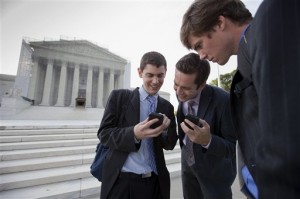
Daniel Rich can barely remember a time without a cellphone.
After receiving his first mobile device just a few years into high school, the 22-year-old Utah native dares not imagine what would happen if he forgot it while running out of the house.
“It would be complete pandemonium,” Rich said with a hint of humor behind his forced honesty. “I use my phone for everything. I can even pay for my groceries using it.”
Similar to grocery purchases, news content follows a similar suit.
Long gone are the days when bulky, ink laden papers or 10 p.m. news broadcasts were the primary sources of news and information. With the emergence of the digital age, the populace is now opting to going online for whatever information they want, wherever they want it.
This has just been reinforced by a recent Dan Jones and Associates survey. According to the survey, Utahns are now getting the majority of their political news digitally.
The survey shows about 39 percent of Utahns get their news from Internet news sites, 31 percent get it from TV and 6 percent from social media. This means nearly 76 percent of Utahns get their political news through digital means.
“I have my phone with me all the time, so I’m able to constantly check for updates,” Rich said. “I get what I want, when I want it.”
Rich likes watching multiple networks covering the same story since it allows him to get an angle from both sides.
“It’s convenient because I’m able to watch it in my own home on my own time,” he said.
Rich’s information-seeking tastes are like those of other millennials. In fact, Rich’s twin brother, Thomas Rich, believes himself and all of their friends to be the same in this regard.
“My parents don’t even get newspapers anymore,” Thomas said. “Like everyone else our age, they kind of see them as things of the past because we can get everything online.”
The Jones survey further probed newspaper readership and found that only three percent of Utahns ages 18–24 say they get their political news from newspapers, whereas 48 percent get it from Internet news sites.
That number sees an even larger boost nationally. According to a recent Pew Research study, 61 percent of millennials surveyed reported getting most political news from Facebook, making it considerably more popular than CNN (44 percent), local TV (37 percent) and Google News (33 percent).
On the other hand, Baby Boomers, which Pew defines as those born between 1946 and 1964, displayed opposite news consumption patterns. Around 60 percent of these Americans get their political news from local television, and only 39 percent rely on Facebook.
Generation X, those born between 1965 and 1980, also relied primarily on Facebook for their politics at 51 percent usage. But close behind was local news at 46 percent and CNN at 45 percent.
However, the overall high rate of political news reading and sharing on Facebook reinforces the importance of social media in political campaign strategies. The use of social media was revolutionized by the Obama campaign of 2008; in fact, some have coined that race as the “Facebook election.”
Exit polls revealed that Obama had won nearly 70 percent of the vote among Americans under age 25, the highest percentage since U.S. exit polling began in 1976. This group of young voters have likewise been coined as the “Facebook generation.”
This likely explains the increased political fodder on millennials’ newsfeeds, as the race to the White House, 2016 edition, is in full swing.
Looking past the emergent climb of digital news and back to the cataclysmic fall of traditional print news, only 11 percent of people said they get their news from newspapers; however, those who still favor the “old” way have their reasons.
“I hate spending more time staring at a computer screen,” said Stanley Dillon, 22, a sophomore majoring in applied statistics. “Reading the paper is easier on my eyes and it still gives me all the news that I want.”
Similarly, Katy Smith, 21, a sophomore majoring in political science, says she reads the paper because she feels that the information printed in the physical papers is what’s most important and relevant to her.
“If they are going to make the effort to print a story, I’m usually going to make the effort to read it,” Smith said.
Despite these print advantages, experts such as Philip Meyer, in his 2004 book “The Vanishing Newspaper,” predicts that the final copy of the last newspaper will appear on somebody’s doorstep one day in 2043.




